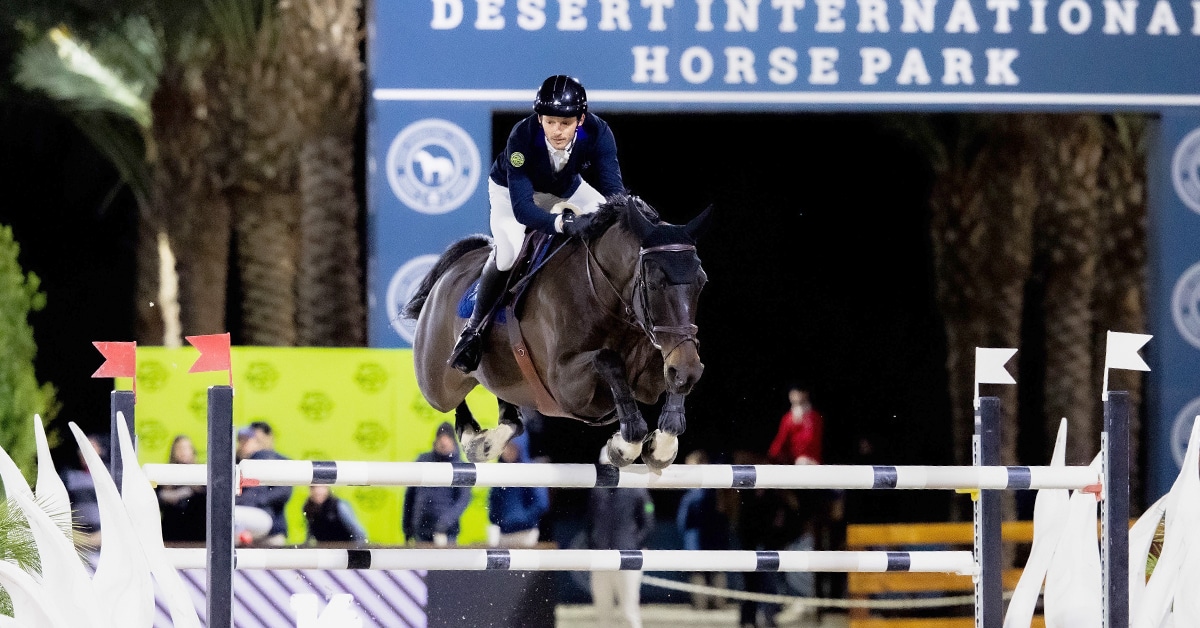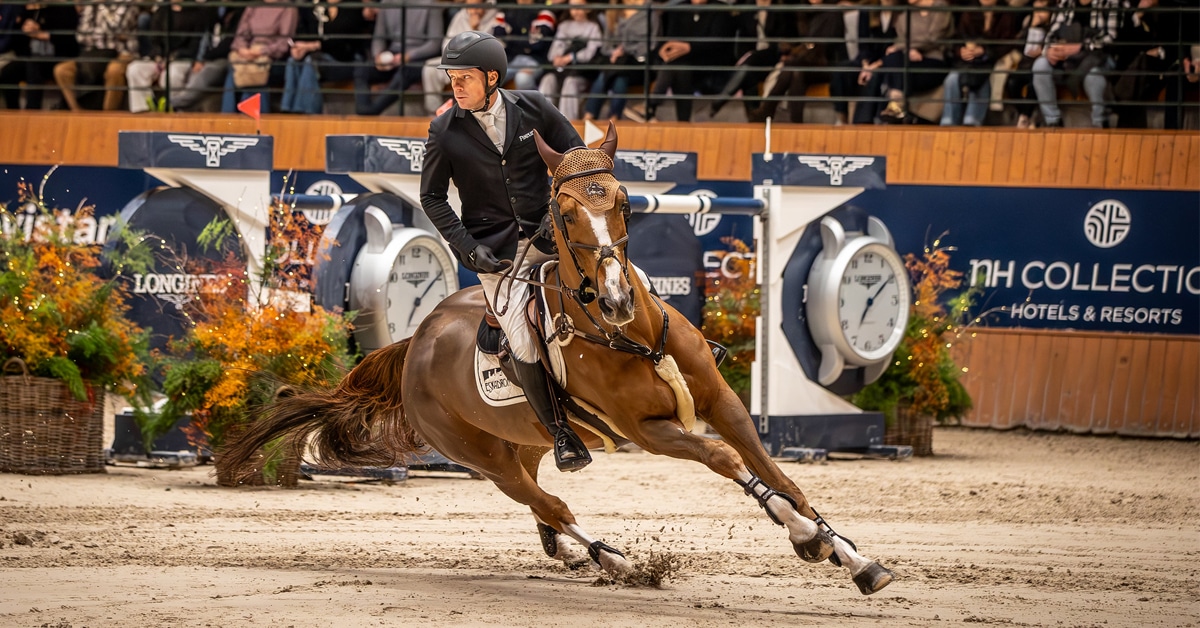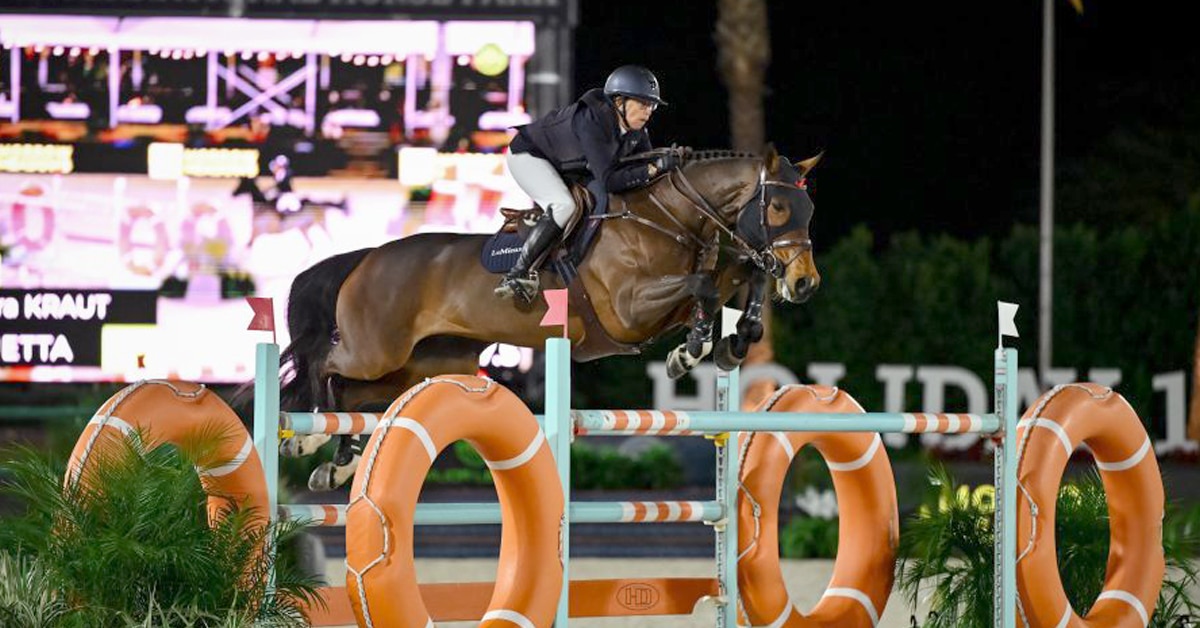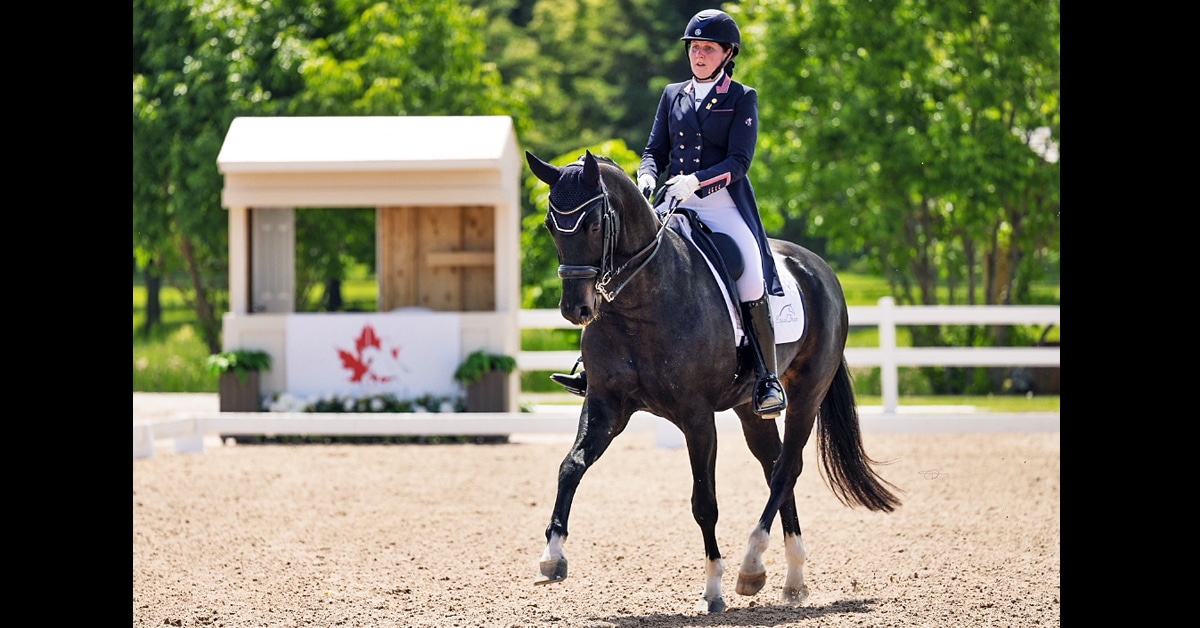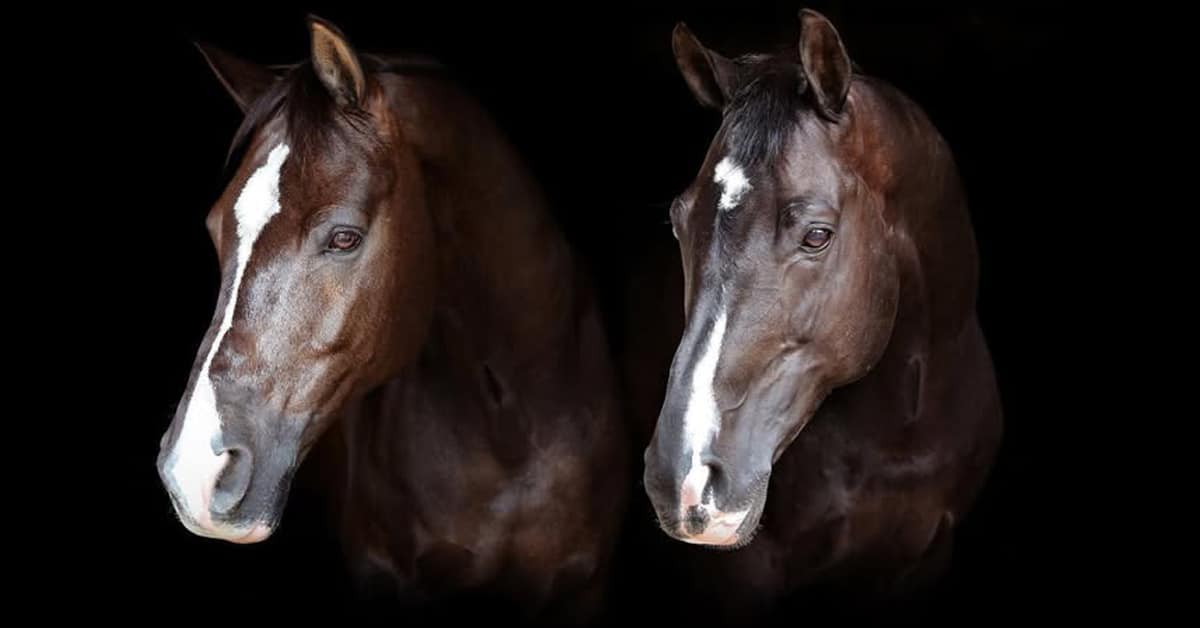When equestrian sport first became part of the Olympic Games, Team Sweden was an unstoppable force taking Jumping gold in Stockholm in 1912, in Antwerp in 1920 and in Paris in 1924. They had to wait 97 years before taking their fourth team title in Tokyo in 2021, but nobody is betting against them making it a fabulous five when the action gets underway at the Paris 2024 Olympic Games next week.
Sweden has dominated the Jumping landscape since that Tokyo victory, taking the World Championship team title in 2022 and the European Championship team title in 2023 while team-member Henrik von Eckermann has stood top of the individual world rankings for the last two years and doesn’t look likely to yield that position anytime soon. So much so that individual Olympic gold is clearly in his sights this time around having clinched back-to-back World Cup titles with his wonderful 14-year-old gelding King Edward who finished just off the podium, in fourth place, three years ago.
Chef d’Equipe, Henrik Ankarcrona, has all three riders from that Tokyo team on call-up and two of the same horses, King Edward and Malin Baryard-Johnsson’s feisty mare Indiana, the latter the alternate selection this time around.
Peder Fredricson who already had team and individual silver medals from previous Games before taking both team gold and individual silver in Tokyo with All In, will partner the 18-year-old Catch Me Not S. And the third Swedish team member is also a veteran, the multi-medalled Rolf-Göran Bengtsson who will bring the 12-year-old stallion Zuccero HV as he lines out at the sixth Games of his sparkling career.
Other nations
Of course 19 other nations will also be battling for the top step of the podium including the Tokyo 2020 silver medallists from the USA and Team Belgium who took the bronze.
Historically, Germany holds the record for the greatest number of Olympic Jumping gold medals with five individual and eight team titles. They won in Berlin in 1936 and were back-to-back champions in Stockholm in 1956, Rome in 1960 and Tokyo in 1964, winners again in Munich in 1972 and in Seoul in 1988, Atlanta 1996 and Sydney in 2000.
The only other country to post back-to-back team gold is the USA. They have topped the podium three times, first in Los Angeles in 1984 and then winning twice in a row at Athens in 2004 and Beijing in 2008. Notably McLain Ward was on both of those last two winning sides and his exceptionally consistent Olympic record also includes team silver in Rio de Janeiro in 2016 and again in Tokyo in 2021. He lines out once again in Paris next week.
If current form is anything to go by however then the considerably smaller nation of Ireland could be the one to beat. The Irish have been hugely impressive in Nations Cup competitions in recent years and scooped team silver at last year’s European Championship. They were ranked the No. 1 country in the world as 2024 began, and their spectacular victory on the hallowed ground of Aachen (GER) just a few short weeks ago suggests they will definitely be ones to watch.
But those European Championships in Milan (ITA) last summer were a reminder that, in equestrian sport, absolutely nothing is predictable. Even the team members themselves seemed to be completely taken aback when Austria pushed the mighty Germans off the medal podium to take team bronze.
Individual
Meanwhile all three Tokyo individual medallists will be in action again.
Great Britain’s Ben Maher, who steered the brilliant Explosion to victory three years ago, is currently ranked second in the world and will this time partner the 10-year-old stallion Point Break. Peder Fredricson’s silver-medal-winning All In is now retired so Catch Me Not S is stepping up and has been showing brilliant form this year highlighted by their third-place finish at the World Cup Final in April. And Maikel van der Vleuten returns with the same horse who earned bronze last time around, Beauville Z, who went on to also take individual bronze for the Dutchman at the World Championship in 2022.
The three-per-team format is unforgiving and only the best of the best will qualify for the individual final, so the stage is set for four days of intriguing sport before another page is written into the history book of Jumping at the Olympic Games.
How it will play out….
In a change to the format introduced at the Tokyo 2020 Olympic Games, the Team Competition will take place first, followed by the battle for the Individual medals.
The Team Qualifier will take place on Thursday 1 August and is open to 20 teams of three athletes, all starting on a zero score. It will be a one-round Table A against the clock.
Team scores will be decided by adding the penalties and time incurred by all three team members. Athletes who do not start, withdraw, are eliminated or retire from the competition will not be given a score, and their team will be placed according to the combined scores of the remaining two team-members. Three-member teams will be placed ahead of teams of two.
The best 10 teams, including those tied for 10th place, will qualify for the Team Final which will take place on 2 August. It will be a Table A class against the clock over one round with a jump-off for first place in the event of equality of penalties. Starting order will be in reverse order of merit from the first Team competition. Disqualification of a team member will result in disqualification for that team.
The first Individual competition will take place on Monday 5 August and is a qualifier for the Individual Final the following day. It will be a Table A against the clock and without a jump-off. Athletes will place according to their penalties and in case of a tie they will be separated by the time of their round. If still tied, they will be placed equal.
The Individual Final on Tuesday 6 August will bring the equestrian events at the Paris 2024 Olympic Games to a close. It is open to the 30 best-placed athletes from the first Individual competition and will be Table A, one round against the clock, with a jump-off for first place if there is a tie on penalties. All athletes start on a zero score in the Individual Final and the starting order will be in reverse order of merit following the first Individual competition.
Some Facts and Figures
- 35 countries
- 20 teams
- 75 horse/athlete combinations
- 15 countries represented by individuals.
Teams will consist of three athlete/horse combinations with all three scores counting for the result.
The youngest competitor in Jumping at the Paris 2024 Olympic Games is 21-year-old UAE team member Omar Abdul Aziz Al Marzooqi.
The oldest competitor in Jumping is Swedish team member Rolf-Göran Bengtsson who is 62.
No female athlete has ever won Olympic individual gold in Jumping, but Great Britain’s Marion Coakes and the amazing pony, Stroller, claimed Individual silver in Mexico in 1968 while in Munich in 1972 her compatriot, Ann Moore, took silver with Psalm.
Three female athletes have won Individual Jumping bronze – Heidi Robbiani (SUI) at Los Angeles in 1984 riding Jessica V, Alexandra Ledermann (FRA) in Atlanta in 1996 riding Rochet M and Beezie Madden (USA) in Beijing in 2008 riding Authentic.
Three former Olympic Individual gold medalists will line out – Brazil’s Rodrigo Pessoa (Athens 2004), Switzerland’s Steve Guerdat (London 2012) and the defending Olympic champion Ben Maher from Great Britain who took the top step of the Individual podium in Tokyo three years ago.
A total of 33 riders will be competing at their first Olympic Games in Paris.
A total of 65 horses will compete at Olympic level for the first time.
Pierre Jonquères d’Oriola from France is the only athlete to win the Individual Olympic Jumping title on more than one occasion. Riding Ali Baba he reigned supreme in Helsinki in 1952 and with Lutteur B he was victorious once again in Tokyo in 1964.
Brazil’s Rodrigo Pessoa will be the most experienced equestrian Olympian at this year’s Games when making his eighth appearance. The 51-year-old Jumping rider previously competed in Barcelona in 1992, Atlanta in 1996, Sydney in 2000, Athens in 2004, Beijing in 2008, London in 2012 and Tokyo in 2021.
A total of seven former Olympic team gold medallists have been listed for Paris – USA’s McLain Ward (Beijing 2008), Great Britain’s Scott Brash and Ben Maher (London 2012), Frenchman Kevin Staut (Rio de Janeiro 2016) and all three members of the victorious Swedish side in Tokyo three years ago – Henrik von Eckermann, Malin Baryard-Johnsson and Peder Fredricson. Baryard-Johnsson is this time listed as team alternate.
The Officials:
Technical Delegate: Guilherme Nogueira Jorge (BRA)
Ground Jury President: Frances Hesketh-Jones (ITA)
Ground Jury Members:
Patrice Alvado (FRA)
Harrij Braspenning (NED)
David Distler (USA)
Karoly Fugli (HUN)
Course Designer: Santiago Varela (ESP)
Co-Course Designer: Gregory Bodo (FRA)
Countries fielding Teams:
Australia, Austria, Belgium, Brazil, Canada, France, Germany, Great Britain, Ireland, Israel, Japan, Mexico, Netherlands, Poland, Saudi Arabia, Spain, Switzerland, Sweden, United Arab Emirates and USA.
Countries fielding Individuals:
Argentina, Chile, Colombia, Denmark, Egypt, Estonia, Greece, Italy, Latvia, Lithuania, Norway, Portugal, Syria, Thailand and Venezuela.
The complete list of Nations:
Argentina, Austria, Australia, Belgium, Brazil, Canada, China, Chile, Colombia, Czech Republic, Denmark, Dominican Republic, Ecuador, Egypt, Estonia, Finland, France, Great Britain, Germany, Greece, Hungary, India, Ireland, Israel, Italy, Japan, Korea, Latvia, Lithuania, Luxembourg, Mexico, Moldova, Morocco, Netherlands, New Zealand, Norway, Poland, Portugal, Saudi Arabia, Singapore, South Africa, Spain, Switzerland, Sweden, Syria, Thailand, United Arab Emirates, USA and Venezuela.
Timetable here
Full lists here
More News
